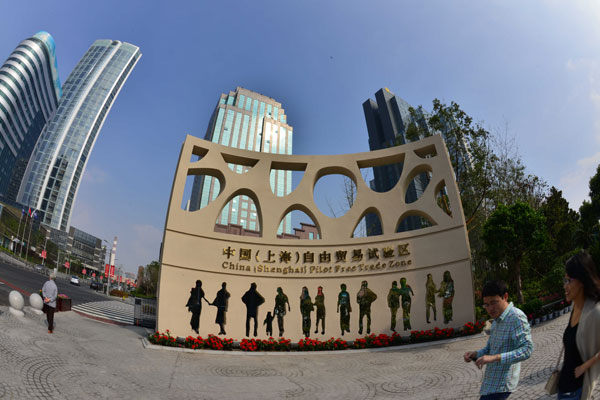Traders in Yiwu cashing in on e-commerce shops
Updated: 2013-10-25 02:19
By YU RAN in Yiwu, Zhejiang (China Daily)
|
||||||||
FTZ's new policies offer platform for neighboring regions to do more business
 |
|
Online sellers based near the China (Shanghai) Pilot Free Trade Zone expect it to benefit trading companies in the area as more overseas orders flood in and new measures stimulate trade. Provided to China Daily |
The launch of the China (Shanghai) Pilot Free Trade Zone will bring improved logistics and better business opportunities to regions like Yiwu, Zhejiang province, home to the world's largest trading market for small commodities.
New laws associated with the trade zone are likely to transform the way companies do business in Yiwu, according to the FTZ's preliminary plan.
Although the city's trading firms have struggled in the wake of the global recession, many are banking on burgeoning online sales both at home and abroad.
The explosive growth of the Internet, which transcends regional and national boundaries, is a boon to the thousands of Yiwu manufacturers and traders who have been hit by rising costs and dwindling overseas demand from importers and wholesalers.
Now, in the sprawling small-commodity bazaars about three hours' drive from Shanghai, shop tenants are busy taking online orders from customers around the world. For most of them, it's a completely new business model.
To be sure, online sales account for only a small portion of their revenue. But that share is growing fast, even as bulk export sales continue to shrink.
By the end of 2012, more than 120,000 companies in the city had applied for an e-commerce platform to do business overseas. And a total of 150,000 parcels a day, on average, were sent overseas in the first quarter of 2013, up 50 percent from the same period last year.
For 42-year-old Ai Shengming, quitting his job at a Yiwu company that made fashion jewelry accessories to start his own business at the end of 2009 was the hardest decision he had ever made. It also was the bravest, as it necessitated using his life savings of 200,000 yuan ($32,800).
For 18 years, Ai had worked as a designer for jewelry companies in Guangzhou, Guangdong province, and Yiwu.
"I obtained enough experience to run my own accessory business," he said, so he registered his company with an online international trading platform via Alibaba to get orders directly from abroad.
His company is called Zhejiang Moon Jewelry Co Ltd.
Ai put drawings instead of photos of his products online as a unique way of promoting them. The items are made at factories he knows to be reliable.
After losing almost all of his savings in the first eight months, he was fortunate to get an order worth $100,000 from a Russian client in 2010.
"There was a period when a great many overseas buyers were logging on to Alibaba to look for Chinese companies to produce cheap items for them instead of coming to China," he said.
Alibaba's online international trading market logs close to 1,000 orders a day on average, with total deals valued at about $30 million. That figure has grown more than sevenfold in the past three years.
As for Zhejiang Moon, Ai's company posted sales revenue of 21 million yuan in 2011 and 24 million yuan last year.
"Those two years probably were the peak period of e-commerce trading in China, as competition was not very tough in the rapidly expanding overseas market," Ai said.
But it got harder to turn a profit as the market became saturated and labor costs rose.
In 2011 and 2012, Ai could make a simple piece of jewelry for about 5 yuan, and he could sell it to overseas clients for 7 yuan. But now, despite his own costs rising due to wage hikes, he can't raise his selling prices due to stiff competition.
As a result, "I've paid more attention to design and drawn a wider variety of products for the clients to choose from," said Ai, adding that "what gives me my edge is the quality and stylishness of my products."
He expects his sales revenue to reach 16 million yuan this year.
Ai said the FTZ should benefit trading companies in the Yangtze River Delta area as more overseas orders flood in and new measures stimulate trade.
As Yiwu is the world's largest market for small commodities like accessories, toys and household gadgets, its exports mainly consist of small items purchased by foreign visitors at the city's shopping malls.
Zeng Hongqi switched roles two years ago from being a jewelry shop owner and manufacturer to becoming an online global jewelry seller.
He believes he was wise to shut down his shop and factory.
"Export trading fell sharply in 2011 from its peak in 2008, with orders down by about 40 percent," said Zeng, who founded Zhejiang Duoying Jewelry Co Ltd.
After two years of declining profits, he opened two online stores and began selling products directly to clients.
"I used to sell pieces of jewelry for 13 yuan each to the trading companies that introduced overseas buyers to us, but I can now sell the same items directly for 14 yuan," said Zeng, noting that each item costs about 10 yuan to make.
As a result of his e-commerce business, Zeng's annual gross profit doubled to 30 million yuan in 2012 from a year earlier.
"Selling products overseas online has enabled me to get closer to the market and see which products are popular with potential clients, who seem to be very interested in things made in China," he said.
At the moment, Zeng has most of his orders built at reliable family workshops. He retained 50 former employees to piece small orders at his three-story headquarters, which is located in a residential building.
E-commerce, he said, "has helped us keep in touch with dozens of regular clients, mostly from Europe and the US. Hopefully, we'll get to work with more foreign clients as a result of the FTZ in Shanghai," he said.
Zeng is targeting an annual output of 300 million yuan by 2018 and hopes to reposition his brand from mid-market to high-end customers.
In 2012, Yiwu International Trade Mart saw online sales and shipments via its 230,000 outbound e-commerce sellers on Alibaba gain an astonishing 400 percent.
"The e-commerce business in Yiwu has expanded rapidly in the past three or four years, and local small business owners have found that selling products online is the quickest and cheapest way to make money," said Liu Wengao, chairman of the Yiwu Electronic Commerce Association.
Liu said the FTZ should create more opportunities for small and medium enterprises in Yiwu to export more goods more easily in the coming years.
Most Viewed
Editor's Picks

|

|

|

|

|

|
Today's Top News
Walmart China strategy: 110 new stores
China's GDP growth to 7.6%: Standard Chartered
Scholar looks at the kung fu-hip hop connection
Starbucks' pricing furor: tempest in a coffee pot
100,000 Strong student exchange picks first partners
Report: China could profit rebuilding US
Holiday may boost sales of new iPads
US press not so free, experts say
US Weekly

|

|















